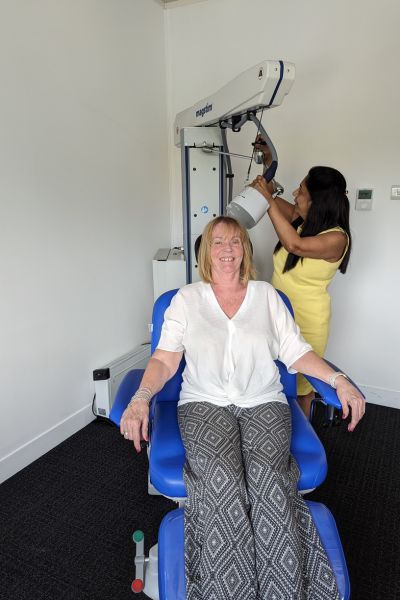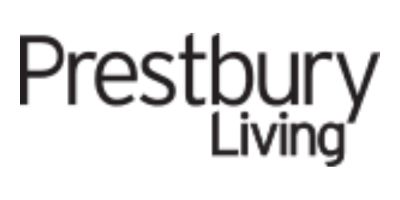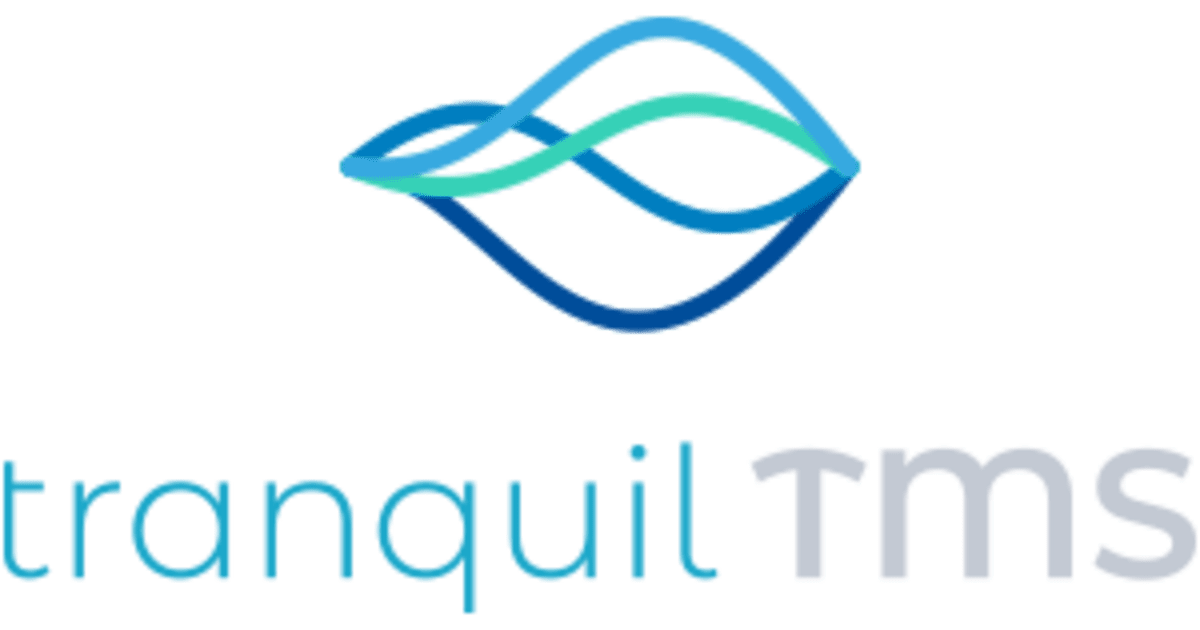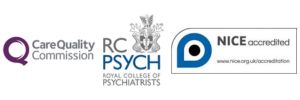TMS Pain Treatment For Chronic Depression
Painless & Immediate Relief from Chronic Pain Depression
Embrace a life free from limitations: Say goodbye to the burdens that have held you back and experience the joy of renewed mental well-being. TMS therapy can improve your mood, boost your energy levels, and enhance your overall quality of life.

Painless, Immediate Relief from Chronic Pain Depression
“The procedure is painless and results are immediate without the introduction of changes in medication. I was able to continue with normal activities immediately after the procedure such as driving.” Ms JT – Patient
We’re proud to say that Tranquil TMS is the longest running clinic of its kind in the North West of England
66.66% of clients respond well to treatment. This is higher than the success rate of anti-depressants for people with treatment resistant depression, which sits at 32%.
In-person or video consultations are available on the clients’ terms.
Experienced, highly trained and personable technicians with a wealth of knowledge in mental health treatments and therapies.
Benefits of rTMS Treatment For Chronic Pain Depression
This type of treatment for depression is non-invasive and requires no medication. We understand how difficult it is for so many people to take medication for their depression. Often pills are ineffective and can have some unwanted side-effects. For many people however, pills are ineffective and have no benefit.
The rTMS method may be used alongside medication but doesn’t require it to start seeing results. Furthermore, our process is pain-free and therefore requires absolutely no anaesthetics or sedatives.
As well as avoiding unwanted side-effects, rTMS acts much faster than anti-depressants and doesn’t require the patient to change their daily activities, as our method is based on science and not routine.
As people we understand the person behind the Chronic Pain Depression, as doctors we know how to help.
If you are suffering with Chronic Pain Depression in silence ask us about rTMS treatment today.
0800 193 0914
Symptoms of Chronic Pain Depression
DEPRESSION CAUSED BY CHRONIC PAIN
There is an unfortunate symbiosis between pain and depression. Chronic depression can cause pain, whilst chronic pain is a common cause for depression. Research has shown that between 30% and 50% of people who suffer with chronic pain also struggle with depression. Long-term conditions such as fibromyalgia, which cause incessant pain, have been known to trigger depression. Indeed, chronic pain increases the chances of developing depressive symptoms three fold, as does having depression increase the chances of chronic pain.
DEPRESSION CAUSED BY CANCER
Depression affects 20% of people suffering with cancer, whilst anxiety affects a further 10%. There are certain types of cancer, such as lung and pancreatic, which release chemicals which are thought to cause depressive symptoms. Furthermore, treatments for cancer can be difficult and certain types such as chemotherapy and corticosteroids have been linked with causing depression. When it comes to these treatments, antidepressants can interact with chemotherapy agents and worsen existing cancer symptoms. It is therefore essential that alternatives are considered.
Painfree
Non-invasive
Medication Free
No Change To Daily Routine
No Anaesthetics
No Sedatives
No Unwanted Side Effects
“I was concerned TMS would aggravate my stress headaches, but on the contrary, they have now disappeared completely. Also, the staff are lovely. Friendly, courteous and genuinely care about what they are doing. Highly recommended.”
Mrs PM – Patient
How rTMS can treat Chronic Pain Depression
rTMS ( Repetitive Transcranial Magnetic Stimulation), is a treatment for depression that is non-invasive, medication free and easily tolerated by patients.
This technology has been developing for over 30 years and since 2008 has been recognised by the FDA in America as a treatment for depression, as well as being approved in England BY NICE, where we are proud to be the first centre in the north-west to provide this treatment.
rTMS works by stimulating targeted areas of the brain, associated with depression, with magnetic pulses. These magnetic pulses target the nerve cells in the region of the brain which control mood, it can activate regions of the brain that have decreased activity, which is common in people with depression.

rTMS Treatment Journey
INITIAL ASSESSMENT
When you first visit us your consultant will ask for a full medical history. From there our specialists will be able to decide whether rTMS is an effective treatment for you. Your specialist will also use this time to discuss the treatment process with you, such as the duration of each treatment and how many may be necessary. We take the time to get to know our patients, in our opinion this is crucial to us helping you on the road to recovery.
TREATMENT SESSION
A great benefit of rTMS treatments is that there is no need for patients to make any preparations beforehand. Once you are settled in a comfortable reclining chair, a magnetic coil will be positioned just above your head. After carefully placing the plate to target the desired area, the machine will be turned on. Patients will remain awake, alert and pain-free for the entire duration of the treatment (20-30 minutes usually). This may sound rather scientific and potentially daunting however, our treatment is painless and very well received by our patients.
AFTER THE SESSION
There is no recovery period after an rTMS session, and you can resume your daily activities immediately. Some patients may feel mild scalp irritation or tingling after their first session, but this usually goes away on subsequent visits.
If you’re in the North West or around and are seeking rapid, medication and pain-free treatment for depression, then contact the team at Tranquil TMS today. Based in Cheadle, our clinic is easily accessible from Manchester, Liverpool, Cheshire, and the surrounding area.
Why Choose Us?
At TranquilTMS we take a personal approach to our clients’ mental health and well-being. As doctors we understand the science behind our methods, but as people we understand the person behind the disorder and truly strive to improve that person’s life. If you are suffering in silence then we are here to listen, to talk and to help.

rTMS Treatment Fees
Online transfers, debit and credit cards are welcome.
After the initial consultation, you can make a case for coverage with your insurance company.
Initial Phone Consultation (20 minutes with a doctor): Free
In-person consultation (2.5 hours with a doctor): £450
Course of treatment: Bespoke to individuals based on history & severity (£180 per treatment).

Referral Process
We accept both GP and self-referrals. This means that you can contact us directly, and do not need a doctor’s referral to begin treatment. Some insurance companies can cover this treatment.
Frequently Asked Questions
How many sessions will I need?
TMS treatment is generally given 5 days a week for up to 4-6 weeks. The number of sessions needed for positive results is different for each person. This will be decided by the consultant and will be discussed at initial appointment.
What does a rTMS treatment feel like?
You may feel a tapping sensation on the area of your scalp underneath the plate, in rhythm with the magnetic pulses. Other than this, however, there are no physical sensations. Patients often choose to read, listen to music or rest during the sessions.
What is the difference between ECT and rTMS therapy?
Both ECT and rTMS are accepted treatments for depression and other mood-related conditions. One of the main differences, however, is that rTMS treatment is non-invasive and also does not require any anaesthetic. While there are a range of side-effects associated with ECT, only minimal side effects are related to rTMS therapy.
Is there a recovery period after rTMS session?
There is no recovery period after a rTMS session, and you can resume your daily activities immediately. Some patients may feel mild scalp irritation or tingling after their first session, but this usually goes away on subsequent visits.
What are the contraindications to rTMS?
Anyone with metal implants, aneurysm clips and coils, cardiac pacemakers, cardiac defibrillators, facial tattoos that may have magnetic ink or ink that is sensitive to magnets, implanted stimulators, metal implants in the ears or eyes, stents in the neck or brain, bullet fragments or shrapnel near the head. Contraindications also include epilepsy and other neurological conditions.
What are the benefits of rTMS?
- Easily Tolerated
- Non-invasive and no medication
- No anaesthesia or sedation
- No change in daily activities
- Minimal side effects
- Quicker response compared to antidepressants
What are the Side Effects of rTMS?
One of the main benefits of rTMS is its minimal side effects. The potential side effects of rTMS include discomfort at the site of stimulation, scalp discomfort, transient headache, neck pain and facial twitching during treatment. In very rare cases, a seizure may occur.
“Recent NICE guidance (IPG 542) concluded that evidence on rTMS for depression showed no major safety concerns.” -The Royal College of Psychiatrists
A New Treatment For Anxiety, Depression and OCD.
TRANQUIL TMS AS SEEN ON:











